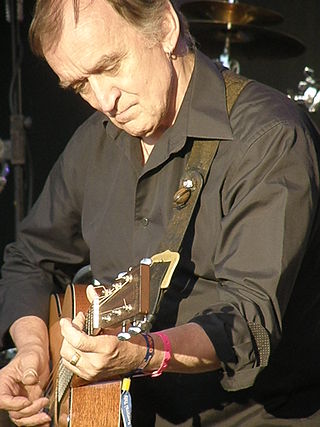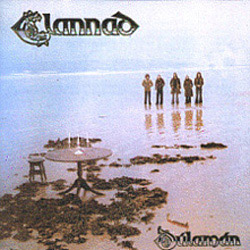
Martin Dominic Forbes Carthy MBE is an English singer and guitarist who has remained one of the most influential figures in English folk music, inspiring contemporaries such as Bob Dylan and Paul Simon, as well as later artists such as Richard Thompson, since he emerged as a young musician in the early days of the folk revival in the UK during the 1960s and 1970s.

Zimbabwean music is heavily reliant on the use of instruments such as the mbira, Ngoma drums and hosho. Their music symbolizes much more than a simple rhythm, as the folk and pop style styled music was used as a symbol of hope for Zimbabweans looking to gain independence from Rhodesia. Music has played a significant role in the history of Zimbabwe, from a vital role in the traditional Bira ceremony used to call on ancestral spirits, to protest songs during the struggle for independence. The community in Zimbabwe used music to voice their resistance to their oppression, as one of the only weapons they had available to fight back with. In the eighties, the Music of Zimbabwe was at the center of the African Music scene thanks to genres such as Sungura and Jit. However, several performers were banned by state TV and radio leading to the closing of several music venues.

Levellers are an English folk rock and anarcho-punk band formed in Brighton, England, in 1988, consisting of Mark Chadwick, Jeremy Cunningham, Charlie Heather (drums), Jon Sevink (violin), Simon Friend, Matt Savage (keyboards) and Dan Donnelly. Taking their name from the Levellers political movement, the band released their first EP in 1989 and LP in 1990, with international success following upon signing to China Records and the release of their second album Levelling the Land. The band were among the most popular indie bands in Britain in the early 1990s, and performed at the Glastonbury Festival, first in 1992, then in 1994, where they performed as the headline act on The Pyramid Stage to a record crowd of 300,000 people. They continue to record and tour.

Adam Stemple is a Celtic-influenced American folk rock musician, based in Minneapolis, Minnesota. He is also the author of several fantasy short stories and novels, including two series of novels co-written with his mother, writer Jane Yolen.

Oysterband is a British folk rock and folk punk band formed in Canterbury around 1976.
Things of Stone and Wood or ToSaW are an Australian folk rock band which formed in 1989. The original line-up was Michael Bruce Allen on bass guitar and backing vocals; Greg Arnold on lead vocals and acoustic guitar; Justin Brady on violin, mandolin and harmonica; and Tony Floyd on drums and percussion. Two of their albums, The Yearning and Junk Theatre peaked at No. 8 on the ARIA Albums Chart. Their 1992 single, "Happy Birthday Helen", which reached No. 9 on the ARIA Singles Chart, was written by Arnold for his then-girlfriend, whom he later married. At the ARIA Music Awards of 1993 the group won ARIA Award for Best New Talent for "Share This Wine". Arnold won 'Songwriter of the Year' at the 1993 APRA Awards.
"Mrs. McGrath" is an Irish folk song set during the Peninsular War of the early 19th century. The song tells the story of a woman whose son enters the British Army and returns seven years later having lost his legs to a cannonball while fighting against Napoleon presumably at the Battle of Fuentes de Oñoro. The general theme of the song is one of opposition to war. Along with "Johnny I Hardly Knew Ye", it is one of the most graphic of all Irish folk songs that deal with sickness and injuries caused by warfare. Irish folk song collector Colm Ó Lochlainn described "Mrs. Grath" as "known to every true born citizen of Dublin". It was very popular among the Irish Volunteers in the years leading up to the 1916 Rising and has been recorded by many singers and folk groups.

Cats Laughing is a folk rock band, founded in the late 1980s in Minneapolis, Minnesota, and revived in 2015. Several of its members, including Emma Bull and best-selling author Steven Brust, are better known as writers of fantasy and science fiction.

"Babbacombe" Lee is a 1971 album by British folk rock group Fairport Convention, which tells the life story of John Babbacombe Lee, a Victorian-era alleged murderer who was condemned to death but was reprieved after the gallows failed on three occasions to work properly. After the commercial and chart success of its predecessor, Angel Delight, the album sold disappointingly, though it was critically acclaimed, and is regarded by the authors of The Electric Muse (1975) as the first "folk rock opera". It was the band's seventh album since their debut in 1968.

Dúlamán is the third studio album by Irish folk group Clannad. It was released in 1976. It is named for its first track, a rendition of the Irish folk song "Dúlamán".

The Pool of Life is the first album released by English band The Onset. It was released by Probe Plus in 1988. The album takes its name from one of the many nicknames of Liverpool, the home city of both the band and the Probe Plus label.

Myths and Heroes is a 2015 album by British folk rock band Fairport Convention, released in January 2015 on the band's own Matty Grooves Records label. The band have released over 30 albums since their debut, Fairport Convention, in 1968.
Boiled in Lead is a folk-punk/worldbeat band based in Minneapolis, Minnesota, and founded in 1983. Tim Walters of MusicHound Folk called the group "the most important folk-rock band to appear since the 1970s." Influential record producer and musician Steve Albini called the band's self-titled first album "the most impressive debut record from a rock band I've heard all year." Their style, sometimes called "rock 'n' reel," is heavily influenced by both traditional folk music and punk rock, and has drawn them praise as one of the few American bands of the 1980s and 1990s to expand on Fairport Convention's rocked-up take on traditional folk. Folk Roots magazine noted that Boiled in Lead's "folk-punk" approach synthesized the idealistic and archival approach of 1960s folk music with the burgeoning American alternative-rock scene of the early 1980s typified by Hüsker Dü and R.E.M. The band also incorporates a plethora of international musical traditions, including Russian, Turkish, Bulgarian, Scottish, Vietnamese, Hungarian, African, klezmer, and Romani music. Boiled in Lead has been hailed as a pioneering bridge between American rock and international music, and a precursor to Gogol Bordello and other gypsy-punk bands. While most heavily active in the 1980s and 1990s, the group is still performing today, including annual St. Patrick's Day concerts in Minneapolis. Over the course of its career, Boiled in Lead has released nearly a dozen albums and EPs, most recently 2012's The Well Below.

BOiLeD iN lEaD, sometimes referred to as BOLD NED, is the first album by Twin Cities-based folk-punk band Boiled in Lead, self-released on its own label, The Crack. It received widespread critical praise after its release; record producer and musician Steve Albini called it "the most impressive debut record from a rock band I've heard all year." It is more strongly centered on a blend of alt-rock and traditional Anglo-Celtic folk than the band's subsequent albums, though the Hungarian dance tune "Arpad's Guz" gives a hint of the band's later eclecticism. Boiled in Lead's first vocalist, Jane Dauphin, plays a larger role here than on Hotheads, her second and final album with the band, singing lead on most of BOiLeD iN lEaD's songs and helping anchor its sound in traditional folk. Bassist Drew Miller also performs lead vocal on a few songs, including "Byker Hill", but after this album would stay strictly an instrumentalist.

Hotheads is the second album by Twin Cities-based alt-rock/world-music band Boiled in Lead. Like its predecessor BOiLeD iN lEaD, it is strongly centered on a blend of alt-rock and traditional Celtic folk, and has been called its "most roundly Celtic" album.

Orb is the fourth album by Minneapolis folk punk band Boiled in Lead. It was produced by Hijaz Mustapha of British worldbeat band 3 Mustaphas 3. Orb found Boiled in Lead exploring a wider range of traditional music styles than ever before, moving beyond the confines of the Fairport Convention-influenced Celtic rock of previous albums and adding material from Albania, Romania, Macedonia, Sweden, Appalachia, and Thailand. The album's title reflects this, suggesting an embrace of a truly global musical perspective. Bassist Drew Miller attributed the widening of the band's sound to the eye-opening realization that their European audiences were just as comfortable with American musical styles as with any European forms. "We came to the decision that since we're Americans, there's no reason we have to play all Irish material. So we don't." Brett Durand Atwood of Gavin Report praised the album's eclecticism, calling it "a one-world sonic showcase for the tunes of our brothers, sisters, and ancestors." Besides the many world-music influences, Orb also delves into punk rock and psychobilly with guitarist/vocalist Todd Menton's "Tape Decks All Over Hell."

Antler Dance is the fourth album by Minneapolis folk punk band Boiled in Lead. It was the band's first recording with vocalist/guitarist Adam Stemple, who replaced Todd Menton after his departure in 1992. Founding bassist Drew Miller has called this personnel change the most significant shift in the band's history. Fiddler Josef Kessler also replaced the departed David Stenshoel. Stemple's addition to the band led to a heavier, more heavy metal-influenced sound, as well as a strengthening of the band's ties to the science fiction and fantasy community. Two songs on Antler Dance were co-written by fantasy novelist and Stemple's Cats Laughing bandmate Steven Brust, and "Robin's Complaint" was written by Stemple's mother, novelist Jane Yolen. The album also includes covers of Boney M.'s "Rasputin" and Bruce Springsteen's "State Trooper", originally from his album Nebraska.
"Jemima Surrender" is a song written by Levon Helm and Robbie Robertson. It was first released on the Band's self-titled album in 1969. Usual Band drummer Levon Helm played guitar and sang the lead vocal while usual Band pianist Richard Manuel played drums. The song's lasciviousness helped inspire Naomi Weisstein to form the Chicago Women's Liberation Rock Band.

Silver is the seventh album by Minneapolis folk punk band Boiled in Lead. The band's first studio album in 13 years, Silver also marked Boiled in Lead's 25th anniversary. The album also reflected a number of significant lineup changes. It was the band's first studio recording after the return of longtime lead singer Todd Menton, and the addition of guitarist Dean Magraw. Longtime drummer Robin Anders played on Silver and at the album's live release show, but would leave the group later that year.
David Rockne Stenshoel was an American musician and visual artist, most well known as a longtime member of Celtic-rock and world-music group Boiled in Lead.














